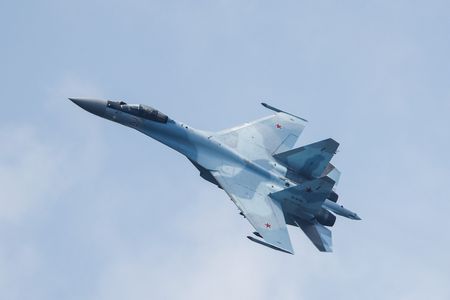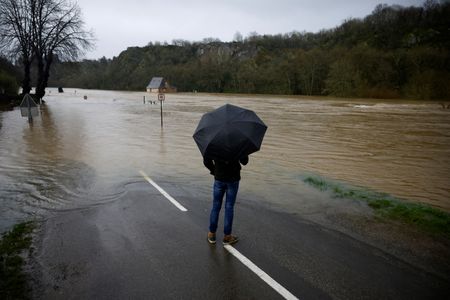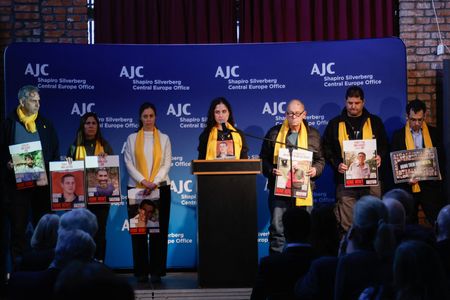By Jack Kim
SEOUL (Reuters) -South Korean President Yoon Suk Yeol’s term in office has been dogged by personal scandals, an unyielding opposition and rifts within his own party, and a rapid fall from grace over his short-lived declaration of martial law last month.
The 64-year-old former prosecutor has already been impeached and jailed and on Sunday he faced unprecedented insurrection charges.
He denies wrongdoing over the martial law declaration and said he did it to protect the country from “anti-state forces.”
Yoon’s legal peril stands in contrast to his storied previous career as a top prosecutor, which launched him into the public eye and sparked much of the support that led to his victory in the 2022 presidential election, his first elected office.
Since narrowly winning then, Yoon became embittered by continual battles that have drawn out a recklessness that a former rival said is his defining trait.
By the time Yoon briefly imposed martial law on Dec. 3 in a move that stunned South Koreans, he was badly bruised politically. He was suspended from his duties after being impeached by parliament on Dec. 14 for his martial law attempt.
Yoon’s political fate is in the hands of the Constitutional Court, which is currently holding his impeachment trial and has six months to decide whether to reinstate him or remove him from office permanently.
Yoon and his lawyers argued at a hearing of the court last week that he never intended to fully impose martial law but had only meant the measures as a warning to break a political deadlock.
On Jan. 15 he became the first incumbent South Korean president to be arrested when he finally backed down in a weeks-long standoff with authorities who have been investigating him over alleged insurrection.
Insurrection is the only charge that South Korean presidents are not immune from, and he could face life imprisonment or even the death penalty, although South Korea has not executed anyone in decades.
Yoon used his refusal to comply with what he called the illegal arrest warrant to rally supporters in the face of snowballing legal and political troubles.
Isolated in his fortified residence in downtown Seoul, Yoon and his Presidential Security Service played a high-stakes game of chicken with authorities who tried to arrest him for two weeks before he finally agreed to appear for questioning.
In a message released as he was being arrested, Yoon said he was not acknowledging what he deemed an illegal process, but was submitting to avoid bloodshed.
He had earlier vowed to “fight until the end” and called on followers to help him save the country from “anti-state forces”.
SCANDALS, THREATS OF PROSECUTION, ‘AMERICAN PIE’
The past year of Yoon’s presidency has been overshadowed by a scandal involving his wife, who was accused of inappropriately accepting an expensive Christian Dior handbag as a gift.
Yoon apologised after the scandal was blamed as a major reason for a crushing parliamentary election defeat of Yoon’s conservative People Power Party in April. But he continued to reject calls for a probe into the scandal and into an allegation of stock price manipulation involving his wife and her mother.
The prosecutors’ office that investigated the allegations decided not to press charges against the first lady.
Yoon’s struggles at home have overshadowed his relative success on the international stage.
His push to reverse a decades-long diplomatic row with neighbouring Japan and join Tokyo in a three-way security cooperation with the United States are widely seen as his signature foreign policy achievement.
Yoon’s ability to bond on a personal level, seen as the trait that gave him his early success, was on full display at a White House event in 2023, when he took the stage and belted out the 1970s pop hit “American Pie” for an astounded President Joe Biden and a delighted crowd.
SHAMANS, HIGH SCHOOL BUDDIES
Born into an affluent family in Seoul, Yoon excelled at school. He entered the elite Seoul National University to study law, but partied hard and repeatedly failed the bar exam before passing on the ninth try.
Yoon shot to national fame in 2016 when, as the chief investigator probing then-President Park Geun-hye for corruption, he was asked if he was out for revenge and responded that prosecutors were not gangsters.
Three years earlier, Park suspended Yoon, then fired him from a team investigating a high-profile case against the nation’s spy agency. That move was widely considered punishment for challenging her authority.
The role he played in jailing Park and his dramatic comeback as head of the powerful Seoul Central District Prosecutors’ Office marked the start of a dizzying rise to power.
Two years later, he became South Korea’s prosecutor general, spearheading a corruption probe of a close ally to the next president, Moon Jae-in. That made him a darling of conservatives frustrated with Moon’s liberal policies, setting Yoon up to be a candidate for the presidency in 2022.
But his presidency got off to a rocky start when he pushed ahead with moving the presidential office out of the Blue House compound to a new site, sparking questions whether it was because of a feng shui belief that the old presidential compound was cursed. Yoon denied any involvement by him or his wife with a shaman.
When Yoon refused to fire top officials after a 2022 Halloween crowd crush killed 159 people, he was accused of protecting his “yes men”. One was Safety Minister Lee Sang-min, a fellow graduate of Yoon’s high school.
Another alumnus of the Choongam High School in Seoul was Kim Yong-hyun, the man who spearheaded the presidential office move, became the presidential security service chief and then was appointed defence minister in September.
Kim was one of the two people who recommended that Yoon declare martial law, a senior military official said. Lee was the other.
Kim has also been charged with insurrection and jailed.
(Reporting by Jack KimAdditional reporting by Josh SmithEditing by Michael Perry and Frances Kerry)











